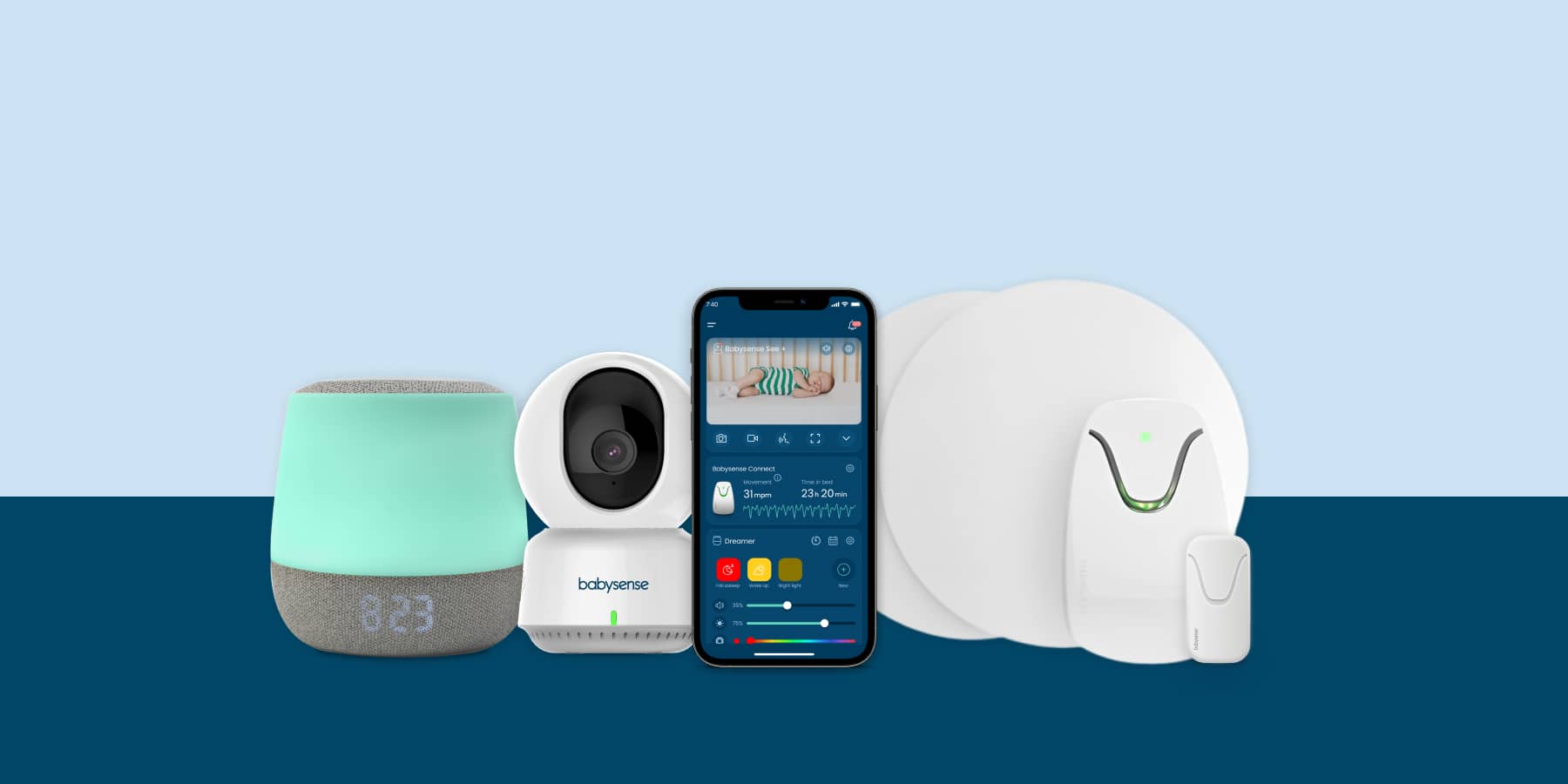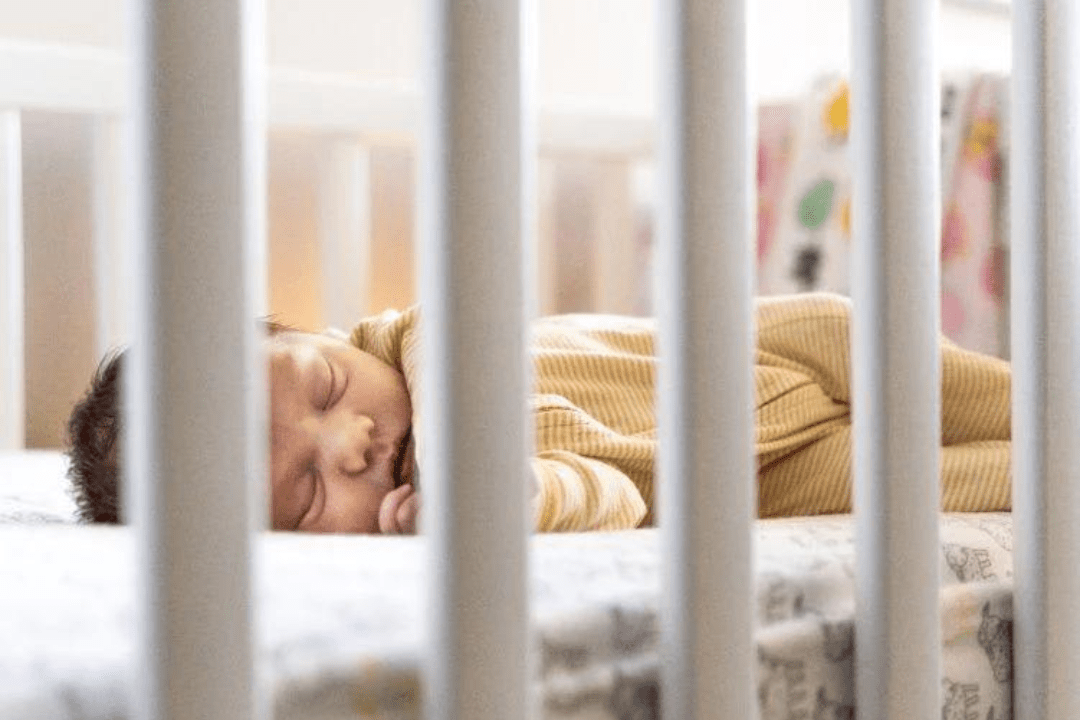It can be extremely worrying to see your baby cry and wail while they are sleeping. But you’ll be surprised to know that this is considered normal behavior and that you don’t have to stress when this occurs.
You’re not alone in wondering why your baby is crying in their sleep. To be honest tiny humans are still quite the mystery. So many parents are confused about how to respond when their baby is crying while in slumber.
This situation leads to tons of questions on whether or not your baby is just hungry, if they are having nightmares, and most especially, how to ensure they return to sleep faster.
To help you navigate through this situation, you need to know what’s causing it in the first place.
Reasons Why Babies Cry While Sleeping
Most parents are startled in the middle of the night or day upon seeing their baby cry on their video baby monitor, only to be surprised that their eyes are closed. Usually, parents head over to their baby’s room to check on them and find out the crying has stopped and the baby is fast asleep once more.
When you constantly wake up because of this problem, it may leave you not only scratching your head in confusion or dealing with stress due to lack of sleep, but wondering why your baby cries in her sleep.
Here are the most common reasons why your baby cries while sleeping.
They Are Transitioning Between Sleep Cycles
The sleep pattern of newborns is one of the essential things to understand as a parent. Just like adults, babies follow specific sleeping cycles. However, they quickly transition between these patterns, spending more time in REM (rapid eye movement) sleep, also known as active sleep, instead of deep sleep.
During the REM stage, you will notice several things, such as your baby moving their legs or arms, moving their eyelids, jerking or twitching, and even crying.
The average sleep cycles last around 40 minutes on average, and many babies awaken at the end of each cycle briefly. They may cry a bit during this time, but they will eventually put themselves back to sleep.
They Are Tired
Just like adults, babies also get stressed when they do not get enough sleep. When your baby lacks sleep or is awake for a longer time than they can manage, their tiredness can affect their sleep. Overtiredness with kids triggers hormones that can make it very difficult for them to fall or stay asleep.
They Had a Long Daytime Nap
When your baby is overtired, it can cause crying while sleeping. But the same thing can also happen if your baby takes naps longer than usual during the day. Should this be the case, it may cause them not to settle as easily and find it challenging to fall asleep at night. Therefore, the kicking and tossing can immediately turn into crying.
They Are Hungry
The stomach of your baby is very tiny. So it’s not surprising for your baby to cry at night because of hunger. However, this may only come as a late indicator after sucking their fists and smacking their lips.
If babies are hungry at night, they may work themselves into a hunger-gas-crying cycle, a very hard frenzy to calm down. When babies are frantic to eat, they gulp air with milk which causes gas.
This occurrence can aggravate more discomfort that makes your baby cry instead of getting back to sleep right after appeasing their hunger.
They Are Experiencing Teething Pain
As your baby’s teeth buds start to come up, it can cause immense pain to them. And they will let you know about it through their constant crying. When your baby is teething, you will notice they will become fussier, and their crying and whining will increase because of the discomfort they are feeling.
If you think your baby is growing its first tooth, you will also notice whimpering and crying while sleeping. If you are unsure what to do to ease their discomfort, ask your child’s pediatrician.
They Still Have an Immature Nervous System
This point is a common reason why newborns cry while sleeping. Your child’s nervous system is still in the process of developing, which makes controlling their movements and reflexes very hard. Because of this, they may kick, twitch, and even cry for no reason at all while asleep.
They Are Suffering from an Allergy
If you are noticing that the cause of your baby’s crying while sleeping is not discomfort, sleep transitions, or hunger pangs, it may be associated with allergy. Cow’s milk contains colic, which can make way for protein allergy.
Some of its telltale signs include crying for more than three hours per day which usually happens during nighttime, for over three days per week, and more than three weeks in a month.
They Are Uncomfortable
It is common for babies to be unsettled at night time if they are not comfortable. Crying is their way of letting their parents know that something is not right. For instance, their diapers or clothes may be irritating them, or maybe it’s too warm or cold.
Can Nightmares Be Causing Babies to Cry at Night?
Parents often worry about their babies crying in their sleep. It’s tempting for new parents to think that newborns cry at night due to nightmares. But although there is still debate on this, there is very little evidence that nightmares are a common cause of crying.
Until your child turns a year old, they won’t have nightmares. What they may experience is something called night terrors, which affect 3% of babies. These terrors also tend to be more common among toddlers and older children.
Night terrors happen during the first hours of sleeping, and during this time, your baby may cry, scream, and become very hard to console. But you’ll be surprised to see them sleeping again after a few minutes.
What Should You Do When Your Baby Is Crying in Her Sleep?
It’s instinctive for every parent to want to hold their child whenever they cry while sleeping. But is that really what you should do? Keep these tips in mind to soothe your little one.
Shorten Your Baby’s Bedtime Routine
If your baby is tired, you should condense their bedtime routine so they can settle to sleep faster. If your baby does not seem well-rested, skip some steps in your usual bedtime routine to speed it up.
For newborns, bedtime routines should be very short and should only include changing their diapers, applying lotion, changing their pajamas, or swaddling them.
Placing them in a good crib also makes them feel more secure. Parents can also rock their children for some time to make them feel drowsy.
For older babies, bedtime routines may take longer since they can include singing lullabies or reading a book. Whatever your routine bedtime activities are, remember that the more consistent it is, the more your baby can learn how to fall asleep faster on their own and go back to sleep without needing your help.
Keep Your Baby’s Room Dark
One of the best ways to establish a good sleeping pattern is to help your baby associate dark with nighttime and light with daytime. During the day, expose your baby to natural light. At night, keep their room or nursery dark.
Don’t Stress About It
This tip may seem counterintuitive, but every parent should know that it is possibly more stressful for you when your baby cries while sleeping than it is for them. If there is nothing to be worried about, let them be. Do not give in to the temptation to pick them up since this can wake them.
What you can do is turn on white noise or shush your baby gently. A lot of babies also settle down from crying when you bounce or rock them. If they have a pacifier, this can also help.
Chances are, your baby’s sleep pattern will become more regular in time, therefore causing them to cry less while sleeping. In the meantime, simply wait for them to stop crying or soothe them gently only when needed.
If seeing your baby crying while sleeping is very concerning for you, do not hesitate to speak to your baby’s pediatrician. Chances are, this medical professional will ensure you that this is just normal.
Remember – Patience Is Key
The peak crying period for babies typically falls between 6 weeks to 8 weeks old. This time is usually difficult for parents, but thankfully, babies will grow out of it.
Sometimes, you can calm your baby in no time, but there will also be instances when it takes longer for them to fall asleep or stop crying. Just remember to be patient. If you are not the only caregiver for the child, take turns.
Once the baby has finally stopped crying, you can put them back to sleep again.
When to Wake Babies
Knowing when to pick up your baby to soothe them or leave them alone takes practice, but the trick lies in listening to the sound of their cries.
Babies who cry due to discomfort, hunger pangs, or sickness will not fall back asleep again after a minute or two. Instead, those cries will intensify by the minute. That is when you should respond.
When waking up your child, try to be calm and quiet, and do whatever you need to do without stimulating their senses too much. This idea is to let them know that it is still sleeping time. You can try whispering to them or rubbing their stomach or back to help them feel better.
If you have a breastfed baby, nursing them may help stop them from crying even if they are not hungry. Nursing is very good for the baby since it helps them feel closer to their mother and lowers their heart rate in preparation for sleep.
When to Consult a Doctor
So, why does my baby cry in her sleep, and what can I do? If your baby’s daytime routine is affected by their excessive crying while sleeping, it’s time to see a doctor since this is a sign that other reasons are causing the problem.
Your baby’s pediatrician can also give you much-needed advice on how to assess your baby’s condition.
Key Takeaways
Seeing babies cry while sleeping can cause sleepless nights for parents. There is nothing worse than spending your night worried about your baby crying in their sleep.
It’s for this reason that you need a reliable baby monitor with a built-in night light and the latest IR night vision like the BabySense Compact Video Baby Monitor. With this device, you can check on them as they settle back into sleep without your intervention.








